
The Real Costs of Launching Your Own Cremation Business
The Real Cost of Entering the Death Care Industry
How much does it cost to start a cremation business? The total investment typically ranges from $250,000 to over $1,000,000, depending on your location, facility type, and equipment choices.
| Expense Category | Typical Cost Range |
|---|---|
| Real Estate/Facility | $150,000 - $350,000 |
| Cremation Equipment | $100,000 - $250,000 |
| Licenses & Permits | $25,000 - $75,000 |
| Initial Inventory | $15,000 - $30,000 |
| Marketing & Branding | $10,000 - $20,000 |
| First-Year Working Capital | $120,000 - $180,000 |
The cremation industry continues to grow steadily, with cremation rates surpassing traditional burial in many regions. This shift presents a significant business opportunity for funeral professionals looking to expand their services or entrepreneurs entering the death care industry. However, the startup costs can be substantial and often underestimated by those new to the field.
I'm Mortuary Cooler, a national-level mortuary cooler supplier with extensive experience helping funeral professionals calculate and manage the costs of starting cremation businesses across the United States. Throughout my years in the industry, I've observed that many entrepreneurs underestimate how much does it cost to start a cremation business, especially regarding temperature-controlled storage requirements and ongoing operational expenses.
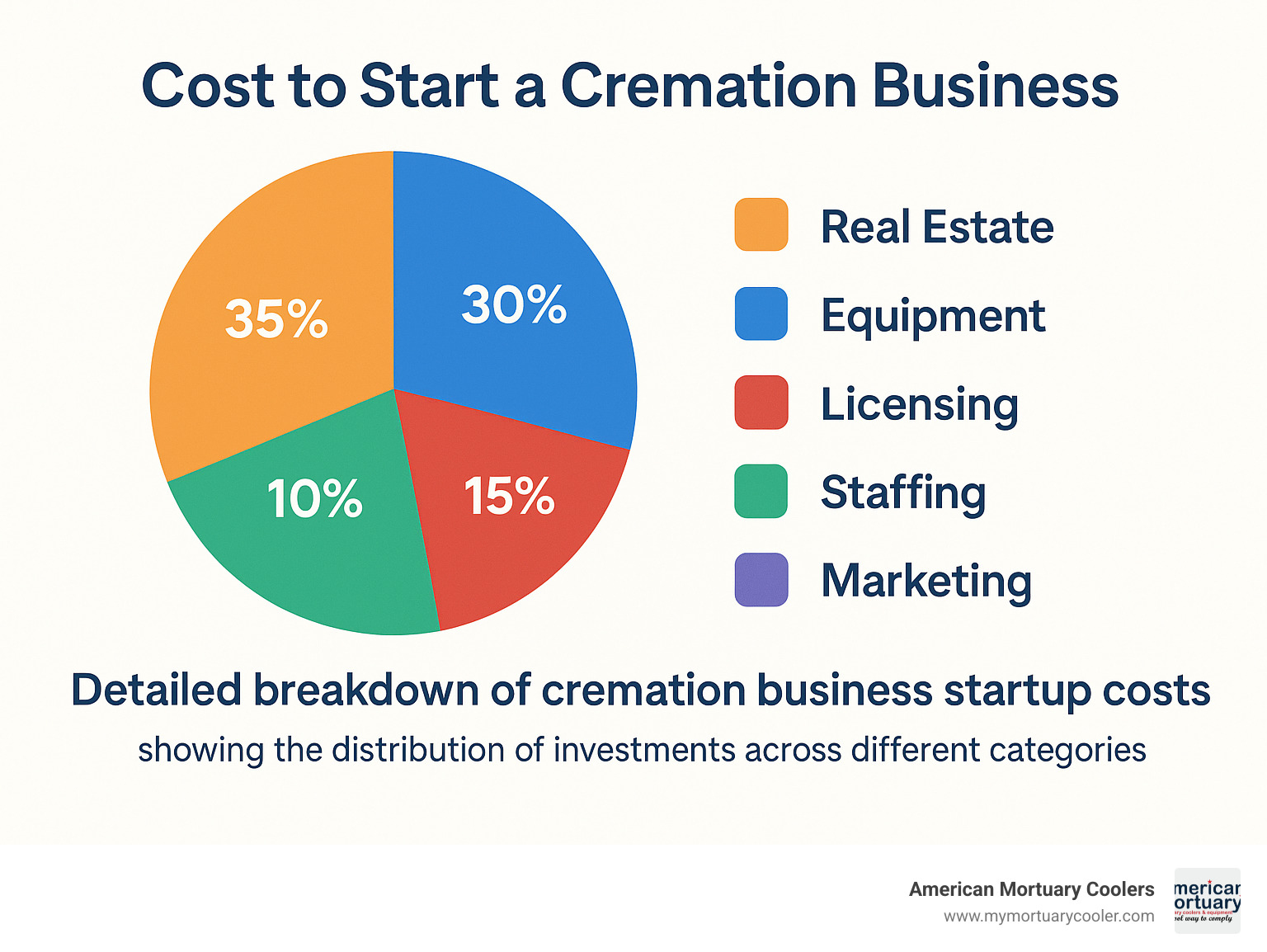
Easy how much does it cost to start a cremation business glossary:
Cremation Business Models & Services Explained
Before diving into costs, understand the different cremation business models available. Each has unique startup requirements, regulatory considerations, and potential revenue streams.
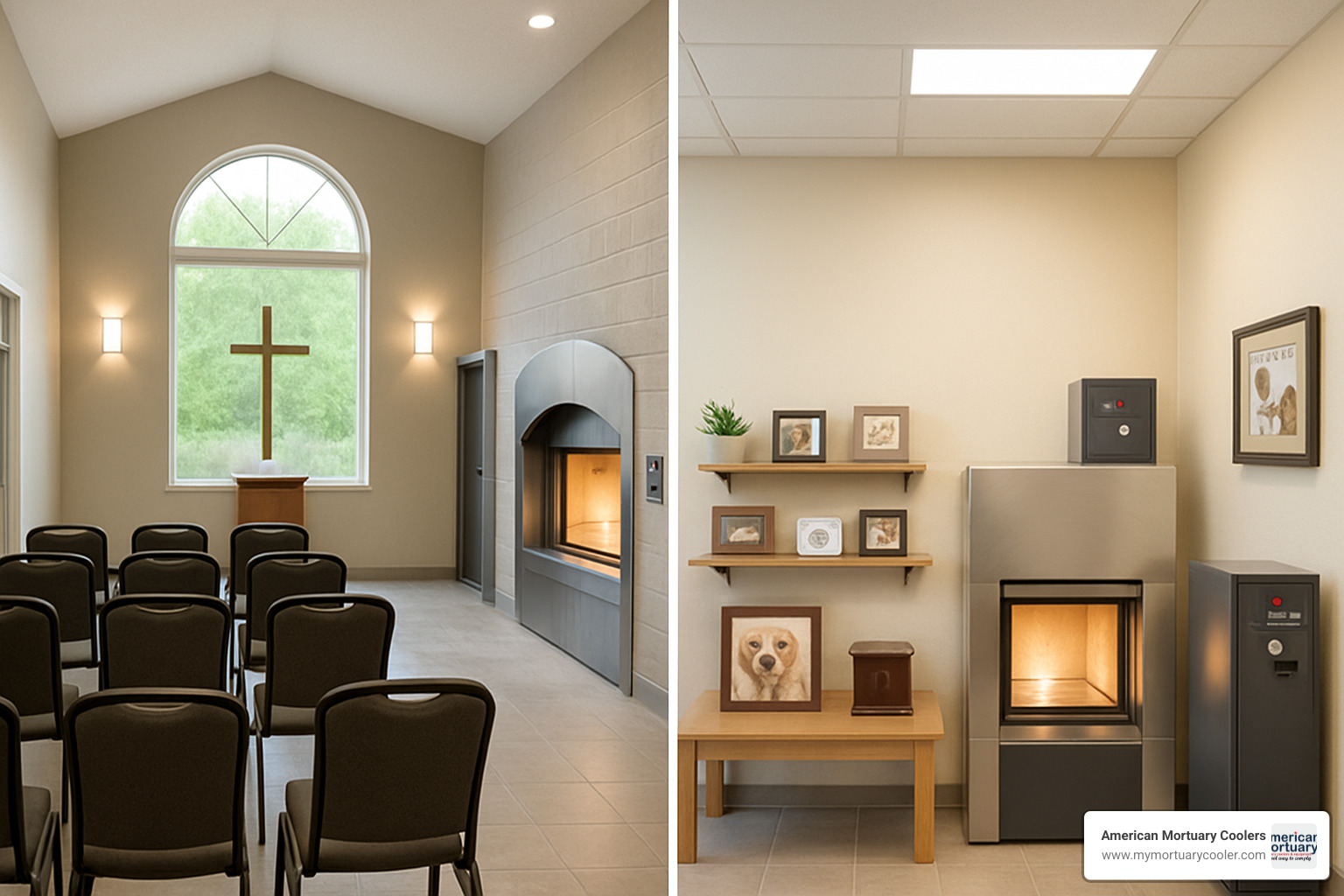
The cremation industry has evolved far beyond its basic roots. Today's successful cremation businesses often blend multiple service types to create a comprehensive offering that meets diverse family needs while maximizing revenue potential.
Human vs. Pet Cremation: Cost & Regulation
When I talk with new cremation business owners, they're often surprised by how different human and pet cremation operations really are.
Human Cremation comes with substantial regulatory oversight. You'll need dedicated cremation equipment (retorts) that can't be used for anything else, and you'll face rigorous licensing requirements. The startup investment typically ranges from $250,000 to over $1,000,000, depending on your location and facility type. On the revenue side, most facilities charge between $1,000-$2,500 per service.
Pet Cremation offers a gentler entry point. As Marco Cannestra, who runs a cremation society in Milwaukee, told me: "When we started, we were surprised by how different the licensing requirements were between human and pet services. The pet side required about 60% less paperwork and significantly lower permit fees."
Pet cremation businesses typically start at $100,000-$300,000, with franchise options available from $20,000-$50,000. Services generally range from $50-$250, based on the pet's size.
Here's the crucial part many don't realize: using the same equipment for both human and animal remains is illegal in all 50 states. If you're planning to offer both services, you'll need separate retorts, which significantly increases your equipment investment.
Service Tiers You Can Offer
Today's families expect options, and successful cremation businesses provide them. Rather than a one-size-fits-all approach, consider creating service tiers that accommodate different needs and budgets.
Basic Direct Cremation serves as your entry-level offering at $800-$1,500. This no-frills service handles the essentials without ceremonies or viewings. It's increasingly popular with cost-conscious families and those who plan private memorials.
Witnessed Cremation provides families the opportunity to be present for the beginning of the process, offering important closure for some. These typically run $1,200-$2,000 and are growing in popularity, especially in certain cultural communities.
Memorial Packages bundle services like ceremonies, urns, and keepsakes, ranging from $1,500-$3,000. These middle-tier offerings often represent your best value proposition.
Premium Packages deliver comprehensive services including pre-planning, grief counseling, and custom memorialization at $2,000-$5,000. While fewer families choose these options, they significantly boost your average revenue per case.
Beyond these core services, today's cremation businesses often find success with eco-friendly options like water cremation (alkaline hydrolysis), keepsake jewelry containing cremated remains, video memorial services, and grief counseling. Pre-planning services also create an important revenue stream while serving families during less emotionally difficult times.
For deeper insights into the equipment that makes all this possible, check out our practical guide to cremation chambers and the cremation process.
How Much Does It Cost to Start a Cremation Business?
Now let's break down the major expense categories that contribute to the total cost of starting a cremation business.
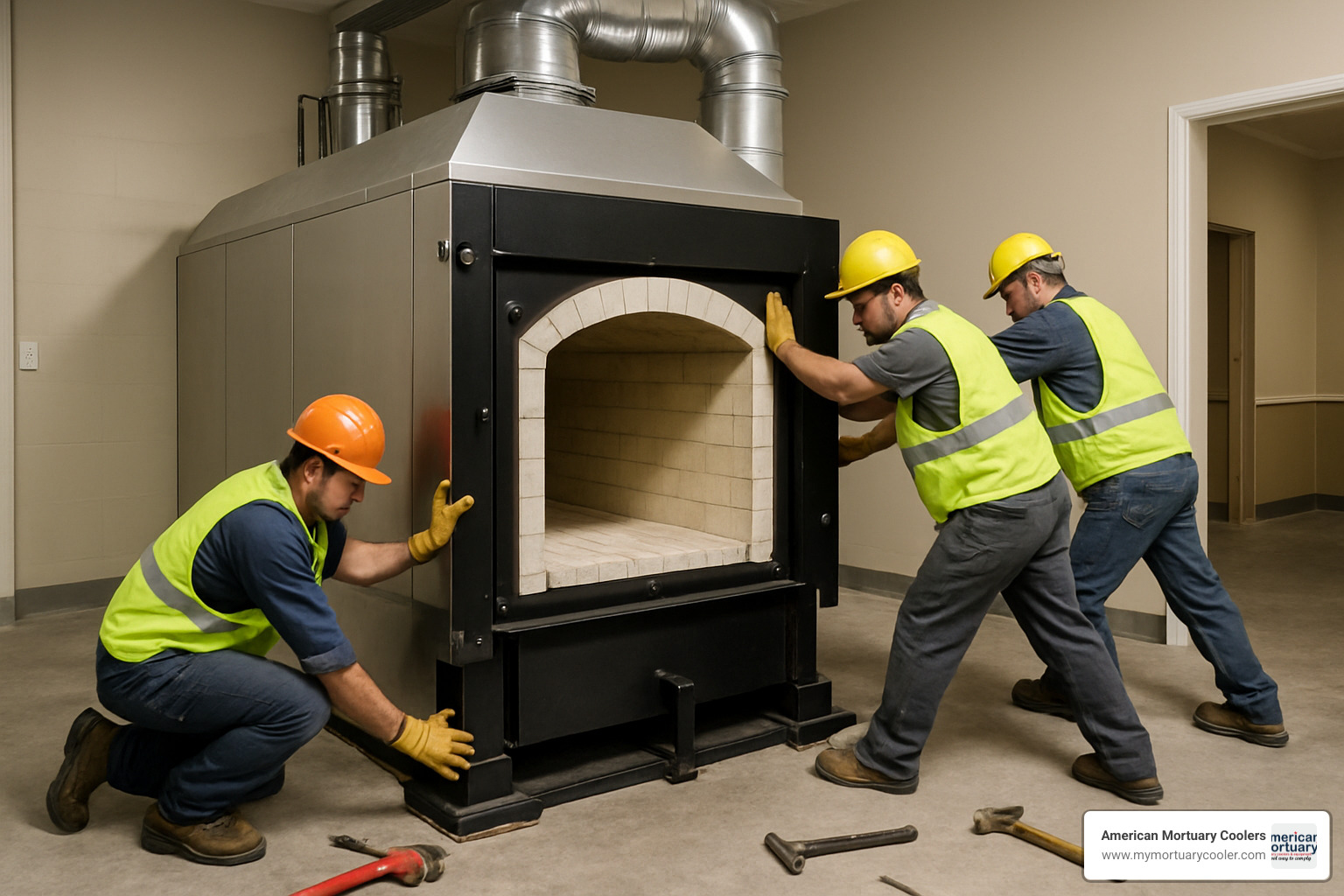
When folks ask me "how much does it cost to start a cremation business?", I tell them to take a deep breath first. The reality is that you're looking at a significant investment – typically between $440,000 and $1,135,000 all-in. That includes everything from the building itself to the specialized equipment that makes it all possible.
But don't let those numbers scare you away! The cremation industry continues to grow steadily, and with the right approach, you can build a sustainable, profitable business. Let's walk through the costs together.
Cost Breakdown: "how much does it cost to start a cremation business" Line-Item View
First up is the heart of your operation – cremation equipment ($100,000-$250,000). Your primary retort (the cremation chamber itself) will run $85,000-$200,000 depending on capacity and features. Don't forget the air filtration systems ($20,000-$60,000) – these aren't optional in today's environmentally-conscious world. You'll also need cooling equipment ($5,000-$15,000), a processor for the remains ($3,000-$8,000), and a lift table with digital scale ($7,000-$15,000).
Your facility costs ($150,000-$350,000) will vary dramatically based on location. Urban areas typically cost 15-30% more than rural locations. Whether you buy or lease, you'll need about 1,200-2,500 square feet with some specific requirements – like an 8'x8' door and minimum 8'6" ceiling height for equipment installation. Don't forget the walk-in cooler, which will set you back $15,000-$40,000 depending on how many deceased you need to accommodate.
The paperwork adds up too. Licenses, permits, and insurance ($25,000-$75,000) include your state crematory license ($1,000-$5,000), air quality permits ($5,000-$20,000), local business permits ($500-$2,000), and possibly a funeral director license ($1,000-$3,000). Insurance is non-negotiable: general liability ($2,000-$5,000 annually), workers' comp ($2,500-$7,500), and professional liability coverage ($1,500-$4,000).
You'll need inventory and supplies ($15,000-$30,000) to get started – urns, containers, memorial products, operational supplies, and basic office equipment. Your marketing budget ($10,000-$20,000) should cover website development, branding materials, initial advertising, and community outreach efforts.
Don't underestimate staffing costs ($90,000+ for the first year). You'll need certified crematory operators ($40,000-$60,000 each annually), administrative staff ($30,000-$45,000), plus training and certification expenses.
Here's a practical tip from our experience at American Mortuary Coolers: consider quality used equipment. Many of our clients in the Southeast and Midwest save 20-30% on their initial investment this way.
| Equipment Type | New Cost | Used/Refurbished Cost | Typical Lifespan | Maintenance Cost |
|---|---|---|---|---|
| Cremation Retort | $150,000-$200,000 | $50,000-$100,000 | 15-20 years | $5,000-$10,000/year |
| Air Filtration | $30,000-$60,000 | $15,000-$30,000 | 10-15 years | $2,000-$5,000/year |
| Processor | $5,000-$8,000 | $2,000-$4,000 | 10+ years | $500-$1,000/year |
| Lift Table | $10,000-$15,000 | $4,000-$8,000 | 10+ years | $500-$1,000/year |
First-Year Working Capital: "how much does it cost to start a cremation business" Cushion
I've seen too many cremation startups run into trouble because they didn't plan for enough working capital. You'll need a cushion to cover 12-18 months of expenses before your business becomes profitable.
Your monthly utilities will run $1,500-$3,000, with electricity being the biggest chunk ($800-$1,500), followed by natural gas or propane ($500-$1,200), and water/sewer ($200-$400). Fuel costs add another $15-$40 per cremation, though newer equipment can be significantly more efficient.
Regular maintenance will cost $400-$800 monthly for equipment servicing, facility upkeep, and refractory maintenance. Your payroll will likely be your biggest ongoing expense at $7,500-$12,000 monthly, covering salaries, benefits, and taxes.
Don't forget ongoing marketing ($500-$1,500 monthly) to keep new clients coming in. And please, set aside a contingency fund of about 10% of your total capital expenditure. Equipment breaks, regulations change, and surprises happen.
As one of our clients in Chicago told me: "I wish someone had told me to double my expected working capital. The first year had so many unexpected expenses, from additional permit fees to higher-than-anticipated utility costs for maintaining both hot and cold zones in the same facility."
The investment is substantial, but with cremation rates continuing to rise nationwide, the opportunity is there for those willing to make the commitment. And remember, at American Mortuary Coolers, we're here to help you steer the equipment side of things with custom solutions that fit your specific needs and budget.
Key Cost Drivers, Compliance & Hidden Expenses
Several factors can significantly impact your startup costs, and many are often overlooked in initial planning.
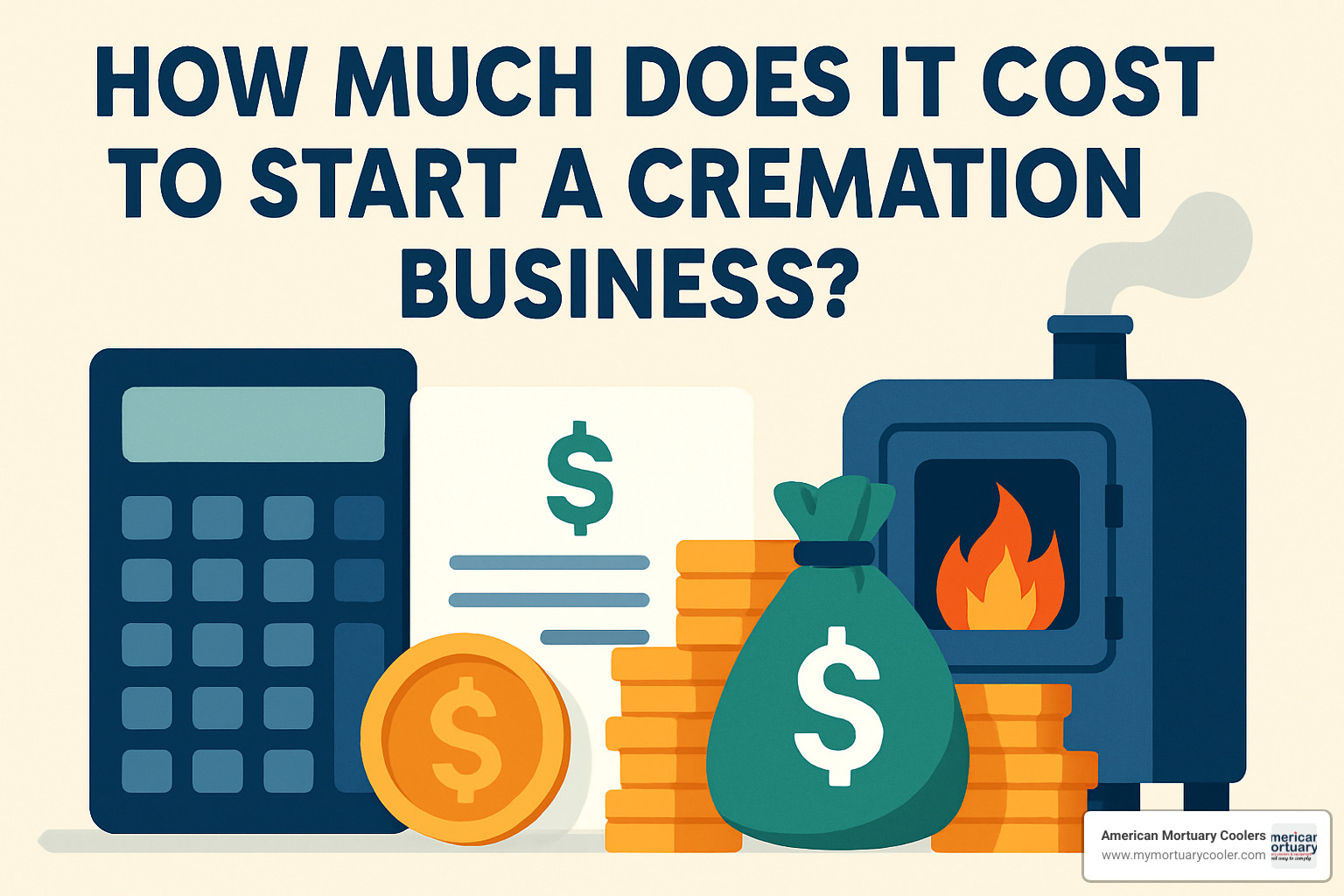
When I talk with new cremation business owners, they often tell me the same thing: "I wish someone had warned me about all the regulatory hoops!" Let's be honest - the paperwork and compliance requirements can be just as challenging as the financial aspects when figuring out how much does it cost to start a cremation business.
Regulatory Checklist & Timeline
The path to opening your cremation business involves a regulatory journey that's both time-consuming and costly. Most owners find themselves navigating this process for 6-12 months before they can open their doors.
Starting with zoning approval, you'll spend about 2-6 months and $2,000-$10,000 verifying that your property is properly zoned for cremation services. This often includes special use permits and community feedback sessions - yes, you might need to face your potential neighbors at public hearings!
Environmental permits typically take the longest, stretching 3-9 months and costing $5,000-$20,000. Your state's Air Quality Division will require detailed applications, emissions testing, and monitoring systems. As scientific research on particulate emissions shows, cremation facilities face increasingly strict environmental standards.
Construction permits (1-3 months, $1,000-$5,000), crematory licensing (1-3 months, $1,000-$5,000), business licenses (1-2 months, $500-$2,000), and final inspections (1-2 months, $500-$2,000) round out the regulatory gauntlet. Each comes with its own paperwork, fees, and potential delays.
"The approval process took nearly twice as long as I expected," shared Mark, who opened a crematorium in Phoenix last year. "Budget not just for the fees, but also for carrying costs while you wait for approvals."
Hidden or Under-Estimated Costs
The true cost of starting a cremation business includes several expenses that rarely make it into initial business plans. These hidden costs can quickly add tens of thousands to your budget.
Facility modifications often surprise new owners the most. The unique dual-temperature requirements of cremation facilities (extreme heat near retorts, freezing temperatures in coolers) require specialized insulation systems costing $10,000-$50,000+. You'll also need soundproofing to be a good neighbor, reinforced flooring for heavy equipment, and specialized ventilation.
Utility upgrades represent another common shock to the system and wallet. Your standard commercial gas line likely won't handle cremation equipment, requiring $5,000-$25,000 in upgrades. Electrical capacity increases, water system modifications, and backup power systems add to this category.
Technology infrastructure has become essential in modern cremation businesses. Beyond basic office equipment, you'll need specialized cremation management software, security systems, remote monitoring equipment, and customer relationship management tools. Budget $5,000-$15,000 for these digital necessities.
Community relations costs are easy to overlook but vitally important. Setting aside $2,000-$10,000 for public information campaigns, community meetings, and relationship building with funeral homes and veterinary practices can make the difference between community acceptance and opposition.
Professional services round out the hidden expenses. Specialized legal counsel familiar with death care regulations, environmental consultants, architectural services, and accounting setup typically add $5,000-$20,000 to your startup costs.
Tom, who opened a crematorium in Atlanta, told me: "We had to completely redesign our HVAC system to accommodate both the extreme heat from the cremation area and the refrigeration needs for the coolers. That alone added over $30,000 to our budget that we hadn't anticipated."
At American Mortuary Coolers, we've guided clients through these complex requirements by designing cooling solutions that satisfy both regulatory standards and operational needs. Our experience with cremation businesses in Chicago, Dallas, and Los Angeles has taught us that proper planning for these hidden costs can prevent painful budget overruns later.
How to Lower Startup Costs & Finance Your Crematorium
While starting a cremation business requires significant investment, there are several strategies to reduce initial costs without compromising quality or compliance.
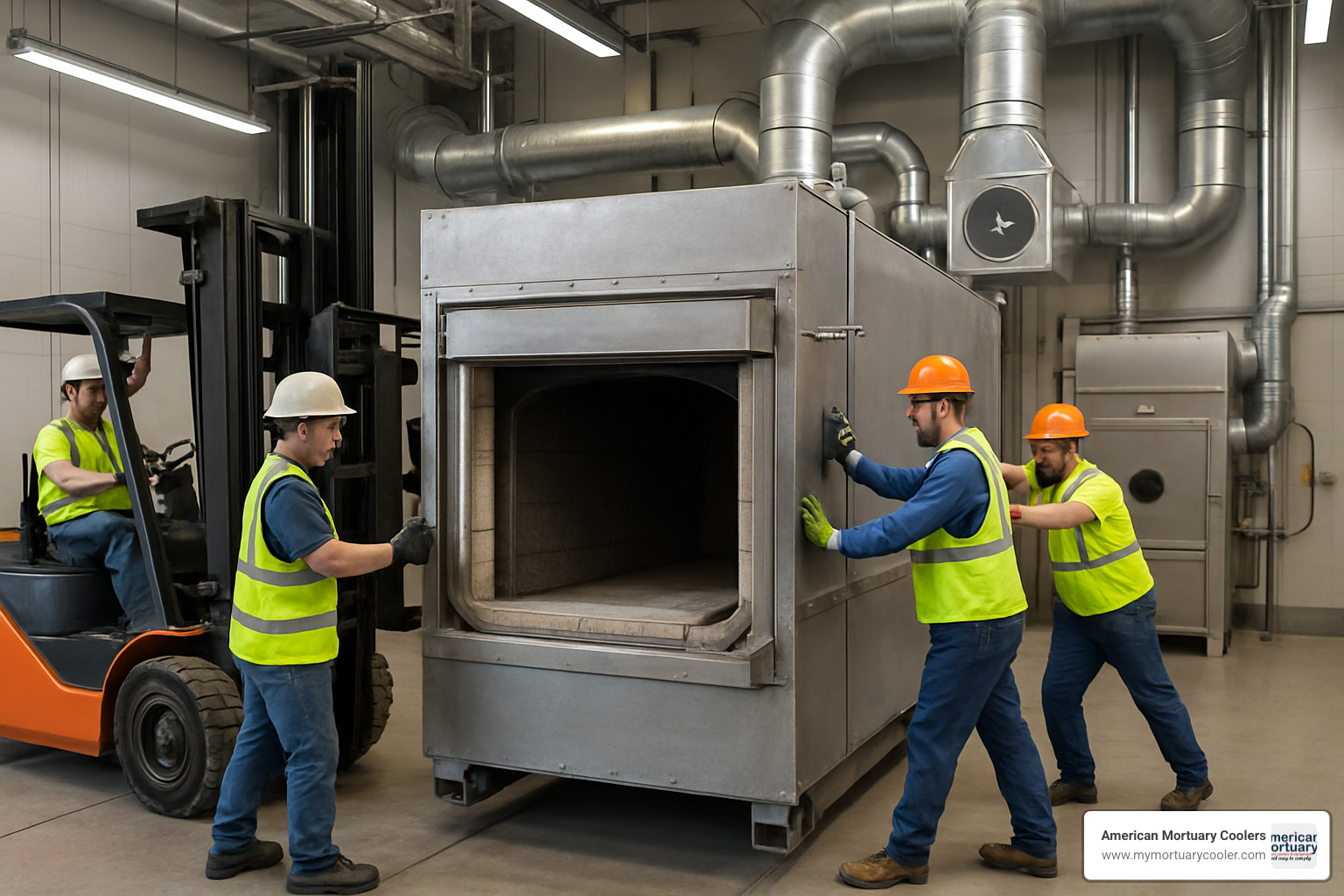
Let's be honest - when you're looking at how much does it cost to start a cremation business, those numbers can make your head spin. But don't worry, I've worked with dozens of funeral professionals who found smart ways to make their startup dollars stretch further.
Equipment costs typically eat up the largest chunk of your startup budget, but you can save 30-50% by considering quality used or refurbished retorts. I recently spoke with Miguel in Phoenix who told me, "My refurbished retort has performed flawlessly for three years now, and I saved nearly $80,000 compared to buying new." Equipment leasing is another option that preserves your capital while giving you access to quality machinery.
For more practical advice on this approach, check out our guide on Burn Less Cash: Quality Used Cremation Equipment.
Your facility strategy can dramatically impact your startup costs too. Converting an existing industrial building often saves 20-40% compared to new construction. Look for properties already properly zoned to avoid the time and expense of variance requests. A crematorium owner in Tulsa shared, "We found a former auto shop in an industrial zone that already had the high ceilings and reinforced flooring we needed. The conversion saved us at least $120,000."
Staffing represents another area where smart planning can preserve capital. Instead of hiring a full team right away, consider phased hiring as your volume grows. Cross-training employees for multiple roles can also maximize efficiency while keeping your payroll manageable during those critical early months.
Creative Budget Stretchers
You'd be surprised how resourceful cremation business owners can get when stretching their startup budgets. One approach that's worked well for several of our clients is arranging shared cooler space with nearby funeral homes. This arrangement can dramatically reduce your initial investment while maintaining proper temperature control and dignified storage.
Negotiating your lease terms can yield significant savings too. Many landlords will consider reduced rent for the first year or tenant improvement allowances when they understand the specialized nature of your business. Just be sure any lease includes provisions for your unique needs, including proper ventilation and zoning compliance.
Franchise options ranging from $20,000-$50,000 can provide a turnkey system with established processes, which might seem counterintuitive as a way to save money, but the guidance and support can help you avoid costly mistakes.
Some regions offer tax credits for clean-air technology, which can offset the cost of advanced filtration systems. And don't overlook group insurance pools through industry associations, which can reduce your insurance premiums by 15-25%.
At American Mortuary Coolers, we've worked with clients across the country to create custom cooling solutions that fit their specific budget and space constraints. One owner in Denver told me, "Having a cooling system precisely sized for my needs instead of an oversized unit saved me thousands in both upfront costs and ongoing energy expenses."
Financing your crematorium requires creativity too. SBA loans offer favorable terms with 10-25 year repayment periods and interest rates typically between 5-8%. Many equipment vendors offer financing packages (usually 3-7 years at 6-12% interest). Don't overlook local economic development incentives, especially if you're bringing jobs to underserved areas.
Starting a cremation business doesn't have to break the bank if you're strategic about where and how you invest your startup capital. By focusing on quality where it matters most and finding creative solutions elsewhere, you can build a sustainable business that serves your community with dignity and care.
Profitability, Break-Even & Growth Outlook — Plus FAQs & Next Steps
When you're weighing how much does it cost to start a cremation business, understanding your potential return on investment is just as important as tallying up those initial expenses.
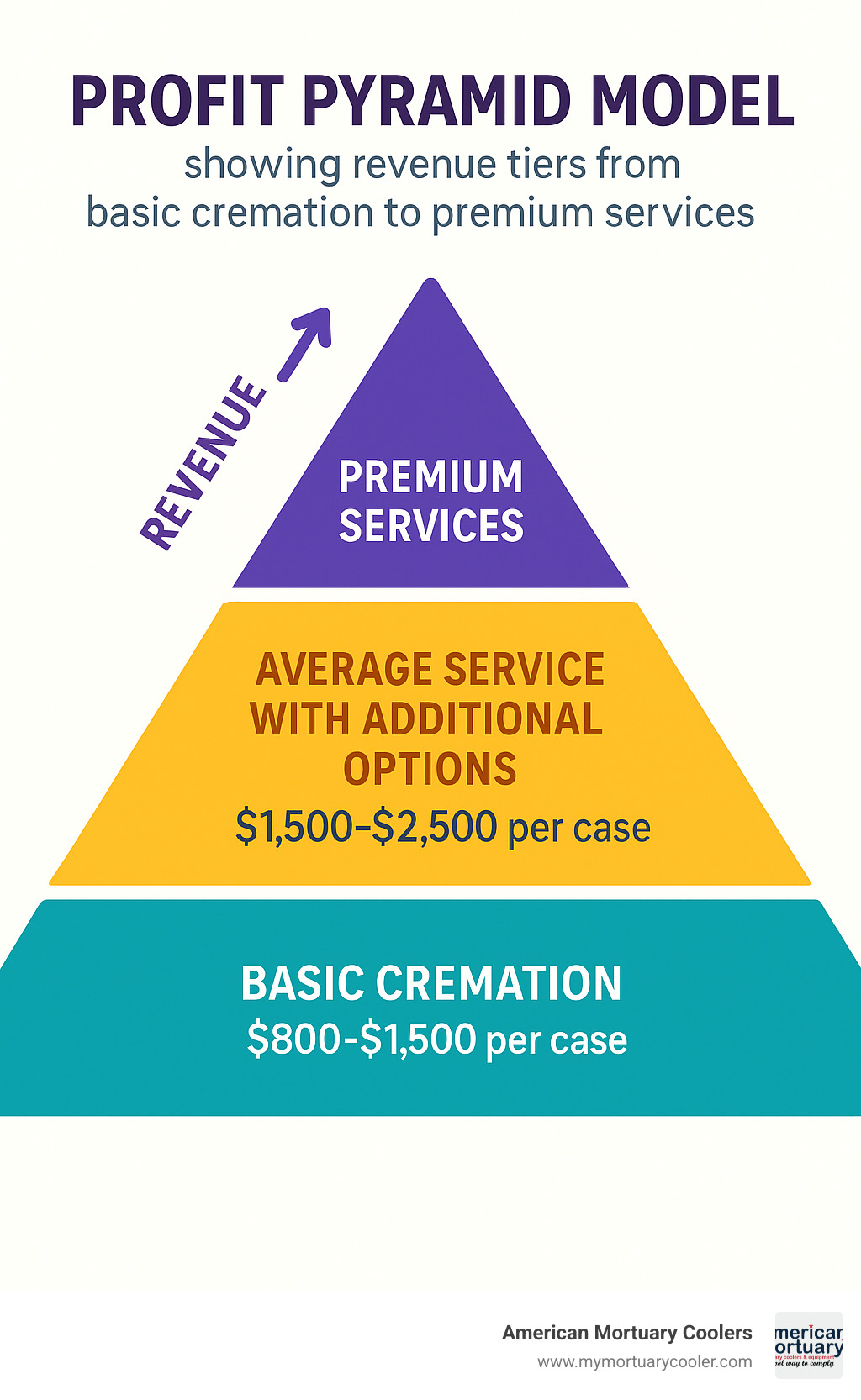
I've worked with dozens of cremation startups across the country, and I can tell you that profitability isn't just possible—it's probable with smart planning. Most established cremation businesses enjoy net profit margins between 10-15%, but the journey to black ink requires patience and operational savvy.
Your revenue potential varies widely depending on your service mix. Basic cremations typically bring in $800-$1,500 per case, while adding memorial services or premium packages can boost that figure to $2,500-$5,000. Pet cremation services, which many operators add as a complementary offering, generally range from $50-$250 depending on the animal's size.
What's particularly attractive about this business model is the healthy gross margins. Direct costs per cremation (including labor, fuel, and basic supplies) usually run $150-$300, giving you a 50-70% gross margin on even your most basic service packages. Premium services often push those margins to 60-80%, while merchandise like urns and keepsakes can carry markups of 100-200%.
"We became profitable in our 19th month," shared a crematory owner from Pittsburgh I worked with last year. "The key was focusing on efficiency and building strong relationships with local funeral homes who didn't have their own cremation facilities. Those partnerships alone brought us 6-8 cases weekly."
Most cremation businesses hit their break-even point at around 10-15 cases per week, with typical payback periods of 2-4 years on your initial investment. If you're in a densely populated area or can achieve a higher-than-average service mix, you might see that timeline shrink considerably.
Frequently Asked Questions about Cremation Business Startup Costs
Over the years, I've heard these questions more times than I can count, so let me address the most common ones:
What's the typical payback period for a cremation business investment?
While 2-4 years is the average, I've seen businesses in underserved markets reach profitability in as little as 18 months. Your mileage will vary based on three critical factors: case volume, operational efficiency, and your mix of basic versus premium services.
Can I start a mobile cremation service without a permanent facility?
Unfortunately, no. This is a common misconception. While you can certainly handle transportation and arrangement meetings at the family's location, the actual cremation must take place in a properly zoned, permitted, and licensed permanent facility. There's simply no way around the fixed-location requirement.
What staffing is legally required to operate a cremation business?
State laws vary significantly, but most require at least one certified crematory operator on-site during all cremations. Some states also mandate that a licensed funeral director oversee the operation. I always recommend checking with your state's funeral regulatory board early in your planning process, as licensing requirements can impact your staffing budget substantially.
How do equipment choices affect long-term profitability?
This is where many new operators make costly mistakes. While that used retort at half price might seem like a bargain, older equipment typically uses 30-40% more fuel per cremation and requires more frequent maintenance. Modern, efficient cremators may cost more upfront but can dramatically improve your profit margins over the equipment's lifespan. Think of it as investing in fuel efficiency for your car—the savings add up with every mile (or in this case, every cremation).
What's the minimum space required for a cremation facility?
For a basic operation, you'll need about 1,200-1,500 square feet at minimum. This includes space for your retort, preparation area, cooler, processing room, and a small office. If you're planning to offer additional services like viewing rooms or chapels, plan on 2,500-5,000 square feet. Zoning requirements often dictate minimum distances from residential areas, so location options may be limited.
Measuring Success & Planning Expansion
Once you're up and running, tracking key performance indicators becomes essential for measuring success and planning growth. Beyond the obvious metrics like case volume and revenue, pay close attention to your fuel efficiency (cost per cremation), customer satisfaction ratings, and referral sources.
When you're ready to grow, several expansion paths make sense. Adding pet cremation services can increase revenue by 25-30% while utilizing much of your existing infrastructure. Installing additional retorts increases your capacity without proportionally increasing overhead costs. Many of my clients have found success expanding into eco-friendly options like water cremation (alkaline hydrolysis) where legally permitted.
One of my clients who expanded from a single location in Johnson City to three facilities across Tennessee shared: "Adding pet cremation services to our existing facilities increased our revenue by 30% with only a 15% increase in operating costs. The key was utilizing our existing infrastructure and staff expertise."
Digital expansion is another frontier worth exploring. Online arrangements, virtual memorials, and strategic digital marketing can extend your reach without the capital expense of physical expansion.
Conclusion & CTA
Starting a cremation business involves substantial investment—typically $250,000 to over $1,000,000—but the growing preference for cremation creates genuine opportunity for well-prepared entrepreneurs. The key is entering this business with eyes wide open about both costs and potential returns.
At American Mortuary Coolers, we've helped hundreds of cremation startups across the country with one critical aspect of their operation: reliable, efficient temperature-controlled storage. Our durable, custom mortuary coolers are built specifically for the unique needs of cremation businesses, and we deliver directly to all 48 contiguous states.
Whether you're starting fresh or expanding an existing funeral operation, proper planning and realistic cost projections make all the difference. With thoughtful preparation and strategic approaches to managing expenses, you can build a sustainable, profitable cremation business that serves your community with dignity and respect.
For more insights into the equipment you'll need, check out our comprehensive guide on Cremation Equipment 101: Tools of the Trade.
Ready to take the next step? Contact us at American Mortuary Coolers today to discuss your specific needs and how our custom cooling solutions can help you build a successful operation that honors both the deceased and their families.



